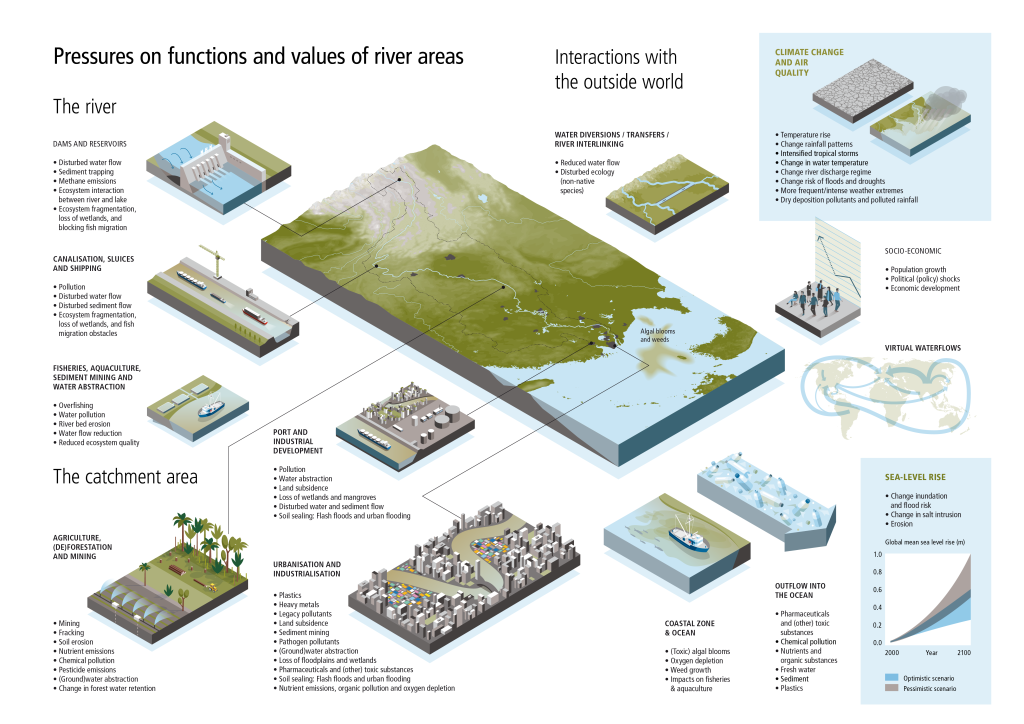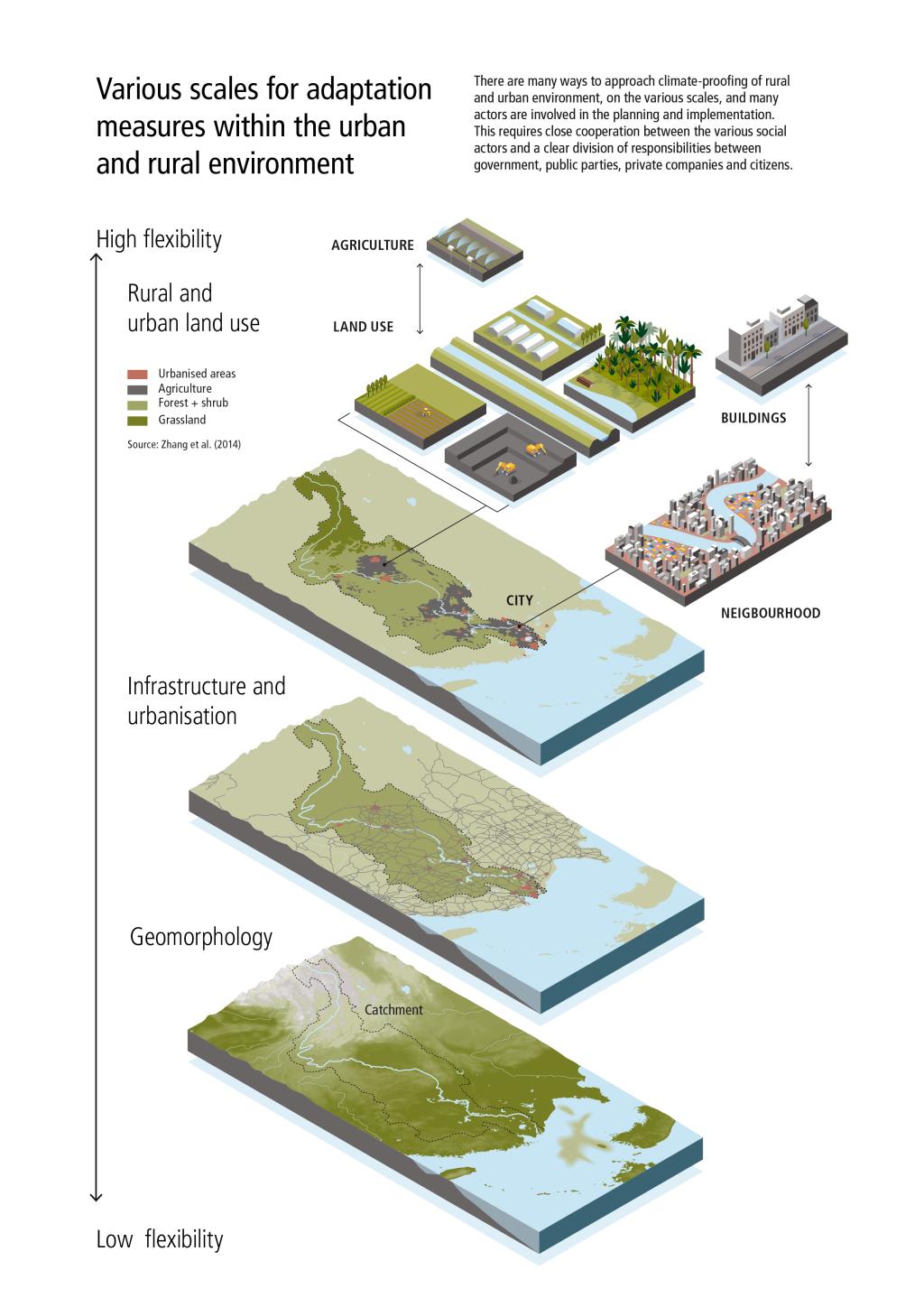Managing river systems in times of climate change
A scoping study coordinated by PBL Netherlands Environmental Assessment Agency shows that improved and integrated river basin management is essential for adequate adaptation to climate change. In addition, it also has global potential to contribute to multiple sustainability challenges. The study finds that policy developments in most countries still barely include climate change adaptation and that there are very few truly integrated approaches.
The study was coordinated by PBL, at the request of the China Council for International Cooperation on Environment and Development (CCICED), and executed together with a team of international experts. It will likely be used as the basis for a five year, internationally oriented, special policy study by the CCICED.
Main Findings
River systems are complex, linking the headwaters in the mountains to the deltas and coastal seas downstream. Around the world and in China, river systems are facing multiple stresses, such as the effects of changes in water and sediment flows, pollution (including legacy pollution), canalisation, water abstraction and wetland reclamation (Figure 1). Compared to the current effects of climate change and sea level rise on some river systems, the impact of these other stressors may be greater, in the short term. In combination with climate change, however, these stresses often introduce different dynamics — resulting in a strong decline in natural ecosystem functioning and river system quality. In other words, climate change significantly complicates, and adds to, already existing stresses.
Worldwide scope, focus on China
The study reports the status of 32 major river systems around the world. It distinguishes 14 categories of stresses on these systems. These stresses include the pressures from human activities in and on rivers themselves and their catchment areas and forces from the world around them, such as climate change and socio-economic developments.

Climate change is seriously changing the arena
Overall, the reality of climate change is seriously changing the whole arena for policy, governance, and research on river basin management. Most people, including politicians and business leaders, are now aware of the disruptive effects of climate change. Yet, at this point in time, the direct and cascading effects of climate change are barely considered in most countries’ policy strategies. This hampers not only adequate adaptation to climate change, but also the progress towards achieving the Sustainable Development Goals. Addressing the various categories of stress one by one (e.g. disruption of water and sediment flows, pollution, flood risk, water abstraction, nature conservation), with climate adaptation as just one more distant issue, will rarely prove be a good strategy. It carries the risk of large cumulative costs, mal-adaptation, the need for repeated interventions and an increase in conflicting interests.
River basins: worldwide opportunities for innovation and new governance practices
River basins present a key opportunity for innovation and for demonstrating the value of policy coherence. That is, coherence between ministries, between national, regional and local policies, between various parts of government, between interest groups and between short- and long-term policies. While implementing climate-resilient and sustainable development is never simple, river systems lend themselves well to this purpose, because river basins are well defined — it is clear what belongs to them and what does not. A river basin is a concrete system that presents opportunities for sustainable management while maintaining important ecosystem services to society. Often, due to vested interests and established practices, socio-economic conditions and cultural issues, managing river basins is complicated, but not overly so. Challenges and possible solutions are known and can be addressed in a practical way. In addition, it is often clear what went wrong in the past. Therefore, building a better future should be possible. Interactions between developments upstream, deltas and marine systems can be incorporated into system-wide mananagement strategies. Technical innovations, new approaches and innovative governance will be required, in order to bend the trend.
Promising approaches
Promising governance approaches to improve river management are emerging; although, currently, there are only a few truly integrated river basin management systems. Some notable successes are being achieved — for example, on improving water quality and managing flood risks — but these are often the result of approaches on a sectoral level and, therefore, do not lead to a high-quality river system, in the long run. The required approaches should be more ambitious, involve a systems approach and acknowledge the geomorphological structures and functioning of the water system as a basis for spatial development (Figure 2), build coherence across sectors and involve a larger array of stakeholders.
Action perspective
The results from our analysis of stress factors across global river systems can be summarised in five high-level principles for climate-resilient and sustainable river system management, which are considered imperatives. They will play out differently, for the individual river areas. The present scoping study proposes these principles are combined in a framework to select cases for in-depth analysis by the CCICED, in the coming years.
- Acknowledge that your responsibilities stretch from the headwaters to the coastal seas. Never shift problems—not from upstream to downstream nor in time. Be aware that a river system is a natural unit for which the interests of both people and nature must be considered.
- Adopt a 100-year perspective and plan your steps. Uncertainties are important. Place them at the core of your strategy, planning and adaptations.
- Engage all stakeholders and develop a shared vision. Engage interest groups and the private sector in the policy development process and its implementation.
- Adapt to climate change and other main river stressors in every aspect of the management of river areas, including planning, management and governance. Apply nature-based solutions where possible. Make spatial planning comprehensive rather than sectoral.
- Continue to strengthen and innovate management methods, knowledge programmes, policy instruments and forward-looking financing mechanisms. Keep sharing experiences within China and worldwide.





